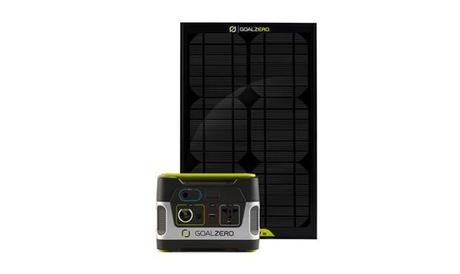 I've mentioned the products from Goal Zero on more than one occasion. They make some of the most lightweight and efficient solar chargers on the market, providing excellent options for keeping our gadgets charged while in the field. I even reviewed their Guide 10 Plus Adventure Kit awhile back, finding it to be a great product for backpackers and climbers alike. Yesterday the company announced an entirely new product that is sure to be of interest to many, particularly those who require a lot of power in a base camp setting.
I've mentioned the products from Goal Zero on more than one occasion. They make some of the most lightweight and efficient solar chargers on the market, providing excellent options for keeping our gadgets charged while in the field. I even reviewed their Guide 10 Plus Adventure Kit awhile back, finding it to be a great product for backpackers and climbers alike. Yesterday the company announced an entirely new product that is sure to be of interest to many, particularly those who require a lot of power in a base camp setting.At the Consumer Electronics Show (CES), Goal Zero took the wraps off of the new Yeti 150 Solar Generator, a lightweight option for portable power while camping. The unit weighs 12 pounds and comes with a convenient built-in handle, making it fairly easy to carry to just about any location. It also comes with built in several built in power plugs including a 12-vold car port, a USB port and even a standard wall outlet. That means you can plug all of your devices, including laptops, into the Yeti 150 and get a quick power-up.
The Yeti 150 is essentially a high capacity battery that can be charged at home via a power outlet or in your car in the 12-volt port. In the field, the unit can be paired with GZ's excellent Nomad 13 solar panel for complete charging off the grid. Using the Nomad, Yeti 150 owners can reportedly top off their charge in as little as 5-10 hours depending on weather conditions.
According to Goal Zero the Yeti can provide up to 15 charges of a smartphone, six charges to a tablet such as an iPad, or two full charges of a laptop. The company says that a notebook computer can be completely powered up in two hours as well, which is a relatively short time all things considered.
This new solar powered solution from Goal Zero seems like a great option for those who are planning a prolonged stay in the backcountry or in a base camp somewhere. It's small size and relatively light weight should make it a popular system, and it's price tag of $400 with an included solar panel isn't half-bad either.
I look forward to hearing more about how well these work once they're put to use in the field.

